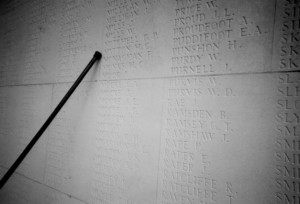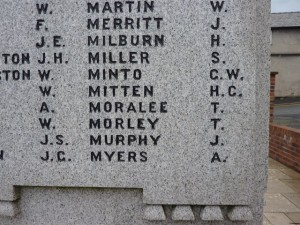Remembrance Day is an event very close to my heart, and I am incredibly proud of my military ancestors, even those I did not meet. This is an updated version of an article I wrote a back in 2011 about the brave men in my family who fought in the world wars.
Harry Collingwood Mitton

My mother’s paternal grandfather, Harry Collingwood Mitton, was born in 1888 in Mungrisdale, Cumberland. He was a Private in the 8th Battalion of the Durham Light Infantry during the First World War. He fought in the Battle of The Somme, and like the hundreds of thousands of other soldiers, he was sadly killed in action. He fought in a particularly bloody battle near Martinpuich, one that resulted in high casualties for both the British and Germans. Haryy was killed on the 29th September 1916; he was 28 years old. He sadly has no known grave, and consequently, his name appears on the Memorial of The Missing in Thiepval, France. Harry left a wife and three children behind, including my grandfather John.

Harry’s name is also on the war memorial in Chopwell, County Durham (where he and his family lived), and on a plaque inside the church in the village. Frustratingly, both were mispelt as “Mitten”. His name is also inside the church in Ainstable, Cumberland, the village where his mother’s family was from and where he lived for most of his childhood. There was a story that his aunt commissioned a stone mason to carve Harry’s name onto the church wall, but he instead carved “Henry Mitton”. Although Harry did occasionally use this name, the aunt was apparently furious and refused to pay the stonemason because of the mistake.
Jown Lawrence Mitton
My grandfather John Lawrence “Jack” Mitton was born in 1913 in Chopwell, County Durham, England and joined the Durham Light Infantry at the age of 23. He later joined the Welsh Guards, eventually reaching the ranks of Lance Corporal. He fought in the Second World War and was captured as a prisoner of war in May 1940 at Boulogne during the Battle of France. He was held at the Stalag VIII-B POW camp in Lamsdorf in Germany (now Łambinowice in Poland) for 5 years. During the winter of 1945, he was made to walk nearly 400 miles in the “Lamsdorf Death March” before being liberated and making his way back home just in time to see his sister before she sadly died due to cancer. Whilst stationed at Sandown Park in Esher, Surrey, he met and consequently married my grandmother on the 27th December 1945. Jack died aged 83 in 1997. Although I do have fond memories of Jack, I was unfortunately too young to find out more about his life and family history.
Frank Vickery Bradford
My mother’s maternal grandfather, Frank Vickery Bradford, was born in 1898 in Thames Ditton, Surrey, England. He worked in the post office as a young man before serving as an Wireless Operator in the RAF. His service records revealed that he fought in both world wars. Like his future son-in-law Jack, my great-grandfather was also a prisoner of war during WW2 for over 5 years. He was held at Stalag Luft III in Sagan in Germany (now Żagań, Poland), the same POW camp where the Great Escape took place. Frank was there at the time of the escape, but he wasn’t directly involved as an escapee, as only 3 prisoners managed to escape alive. He was likely to have known about the plan, or even assisted in it, as many of the prisoners were. According to family stories, Frank “wasn’t the same man” when he came back, and died aged 62 in 1960.
Thomas McMahon
My paternal grandfather also served in the Second World War. Thomas McMahon was born in 1913 in Miltown Malbay, County Clare, Ireland, and from what I have been told, that as an Irishman, he wasn’t allowed to serve for the English Army so instead joined the Scottish Army, eventually becoming a Corporal in the 1st Battalion of the Seaforth Highlanders. I am in the process of obtaining my grandfather’s service records but I know from other family members that he served in both Assam in India and in Burma Campaign. I have been told stories by my aunt about his time during the one. One story was that during combat, a grenade landed in Thomas’ unit’s trench. In an incredible act of bravery, Thomas picked up the grenade and threw it away, only for it to detonate soon after he let go, consequently blowing apart several of his fingers that he later had wired back together. Another story tells how in Burma, he was captured by the Japanese and was made to line up to be executed by the Japanese soldiers. With only a few men ahead of him, and many already hanged, some American pilots flew overhead and the Japanese soldiers fled.
The men I have talked about above are the reason I wear a poppy. Although they are all very sad tales – especially that of my great-grandfather who was killed at such a young age – I am extremely proud to be descended from such brave people. I cannot even imagine the terrible things they went through for their country. I have the same respect for any man or woman serving in the armed forced today.